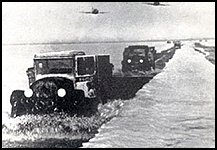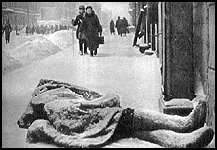January 27,
1942
Rommel, his forces
dispersed in the advance, launches a feint against Mechili, threatening to
encircle the Commonwealth forces at Benghazi. The British panic and order the
hurried evacuation of the port.
Japanese troops land
at Pemangkat in Dutch Borneo and Russel Island in New Guinea.
The US Navy submarine
Seawolf arrives at Bataan with its feeble supply of ammunition. All of
the surviving pilots are evacuated when the submarine left that night.
Soviet
forces capture Lozovaya on the Donets front.
Return to
the top
January 28,
1942
Rommel’s
forces reoccupy Bengazi and capture a huge quantity of supplies that the British
were unable to withdraw or destroy.
Return to
the top
January 29,
1942
Churchill
“survives” a vote of no confidence in the House of Commons by a the margin
of 464 to 1.
British Bomber
Command, deviating from their nightly terror bombing of German cities, launches
a 16-plane raid against the German battleship Tirpitz in Norway. Only two
planes reach the target area and no damage was reported to the Tirpitz.
US and Filipino
forces destroy the Japanese beachhead at Point Longoskayan.
Soviet
forces attack and inflict heavy losses on the Germans southwest of Kaluga,
recapturing Sukhinichi (the third time the town changed hands in less than a
week).
Return to
the top
January 30,
1942
In celebrations of
his ninth anniversary of seizing power in Germany, Hitler, in a capacity crowd
at the Sports Palace in Berlin said, “… the result of this war will be the
complete annihilation of the Jews.”
Japanese forces
capture the naval base of Amboina between the Celebes and New Guinea.
Heavy
fighting is reported at Moulmein, Burma as Japanese forces take the city.
Return to
the top
January 31,
1942
In their first
offensive action of the war, US Navy carriers launch airraids against Japanese
bases at Kwajalein, Wotje and Maloelap in the Marshall Islands. The carrier Enterprise
was damaged by a Japanese torpedo bomber.
Japanese forces drive
the British defenders off the mainland of Malaya and lay siege to Singapore.
Officials in
Leningrad reported that as of 1/31/42, 200,000 civilians had died of starvation
and exposure since the start of the siege five months ago. However, some relief
was finally coming to the city as the “Ice Road” across Lake Ladoga was
finally bringing in badly needed supplies and evacuating those not critical to
the defense of the city.
The Australians
defending Dutch Timor surrendered to the Japanese. In the next week over half of
the captives would be beheaded or bayoneted after capture.
Return to
the top
February 1,
1942
British forces
continue to retreat in North Africa, moving toward the Gazala-Bir Hacheim area
(west of Tobruk).
Zhukov is promoted to
command all Soviet Fronts (army groups) in the Moscow area. His command includes
West, Kalinn and Bryansk Fronts.
The Soviets launch a
major offensive in the Vyazma area.
German
U-boats begin using the “Triton” cipher, replacing the “Hydra” cipher.
This move effectively silenced the intelligence take by the British for nearly a
year.
Return
to the top
February 2,
1942
Heavy fighting is reported in the
Crimea as Russian forces retake Feodosiya.
Return to the top
Those wishing to
contribute items. stories or comments should contact D.A.
Friedrichs
|
Editor's
Corner
The items
found in this section are comments from the editors of Project 60 and
may not necessarily reflect the opinions of bartcop.
Vietnam
and Afghanistan
When the
“war against terrorism” began, many knowledgeable people warned that
our operations in Afghanistan would turn into another Vietnam. In the
flush of “victory”, much of the gloomy projections have been
relegated to the trash heap.
However,
there are still some interesting comparisons that can be made.
In the early
days of Vietnam, the United States inserted teams of Special Forces, to
assist in establishing good relations with the locals by helping with
village defense, health, and education programs. These operations were
highly successful in combating the influence of the Viet Cong. In the
Afghan war, a similar, and, like its predecessor, highly successful
program is well underway.
Like Vietnam,
we are currently destroying any good will we have with the locals by
blowing stuff up. The old saying “we had to destroy the village in
order to save it” is alive and well and making a comeback in
Afghanistan. However, we have progressed a long way in 35 years. In
Vietnam, we would send an infantry platoon with Zippos into a village
and burn it down. In Afghanistan, the mud doesn’t burn, so we use
precision-guided ordnance to turn peoples homes into craters. The
downside of this “improved” system, is that by the time we get
around to blowing up a house, a wedding party moves in and we blow up a
few score party-goers like we did at Qalaye Niazi.
The
biggest similarity between the two wars is the Pentagon briefings. The
goals and objectives are different but the level of lies and deceits
have not changed one bit. In Vietnam, the goal was to show progress by
inflating “body counts”. In our new, more compassionate world, we
measure progress by how many buildings we blow up in a sterile and
non-violent manner, with “minimal collateral damage”.
In Vietnam villages were called Viet Cong strongholds and in
Afghanistan they are called Al Qaeda compounds. In reality, these are
places which were filled with people, who wanted nothing more to try to scratch out
a life for themselves before we came and destroyed everything in their
pitiful lives.
The one area
that is glaringly different is how the US press is conducting operations in
the two wars. In Vietnam, the horrors and violence of war were brought
home. We saw that people, our soldiers, their soldiers, innocent people,
were horribly maimed and killed in war. Since Desert Storm, war for our
citizens has been converted into some sort of sick bloodless video game.
Our press today call sitting in a pentagon briefing journalism and don’t bother
to fact check the lies they are fed by the Administration. The India
Times has better, more accurate and more complete war coverage than the
New York Times. This is a sad and pathetic commentary on the health of
our Fourth Estate.
Like Vietnam,
one of the reasons we got involved in the first place was to prop up a
corrupt and inept government, which we installed. In Afghanistan, we
have installed a government, but it remains to be seen just how corrupt
and inept it will be. Early signs, despite what is reported in the US
media, are not particularly encouraging.
In Vietnam,
the primary reason for our presence was to stop Communism. In
Afghanistan, we have traded the bogyman of Communism for terrorism. Both
were and are vile and, if you will, evil. However, neither will be
defeated by military intervention. Economic stability, justice and
self-determination are the keys to defeating both of those enemies.
In both
Vietnam and Afghanistan, the more compelling, and less acknowledged,
reason for intervention appears to be US business interests. In the
60’s it was rubber and oil. Now it’s just oil and not even really
oil, just a place to put a pipeline that the Ruskies don’t control.
We seem to have an annoying habit of trading red blood for black gold.
So
in the end, there are quite a few similarities. We can still avoid the
bloodbath of Vietnam. There is no reason for our military to continue
the bloodletting. With luck and some thought, perhaps we can avoid the
need to put another black wall on our national mall. We shall see.
Previous
Columns
Want to Win - Think Before You Lash Out
- "If we are serious about taking the war to the enemy, it is time to
look ..."
The
First Fight Against Fascism - We must remember the Spanish Civil
War also.
Arguing
Victory - "... Each nation who fought against fascist tyranny in WWII brought with it
part of whole needed to defeat that evil..."
War, Glory,
Honor and Remembrance - "War is a
brutal and savage insult on human society..."
The
First Casualty... in time of war, those in power are even more inclined to hide the truth,
since that truth is often manifest in the most gruesome and terrible
acts.
|

